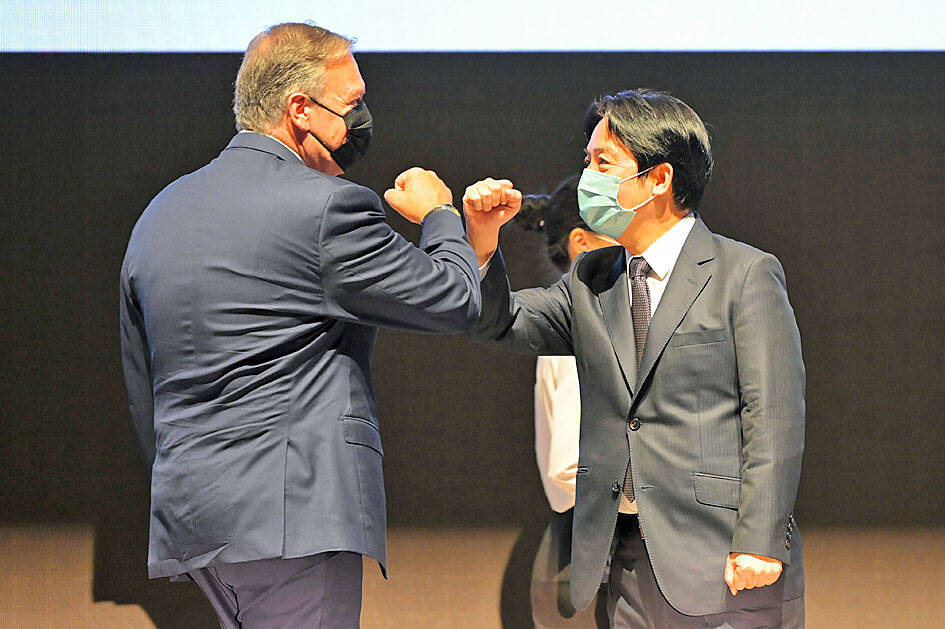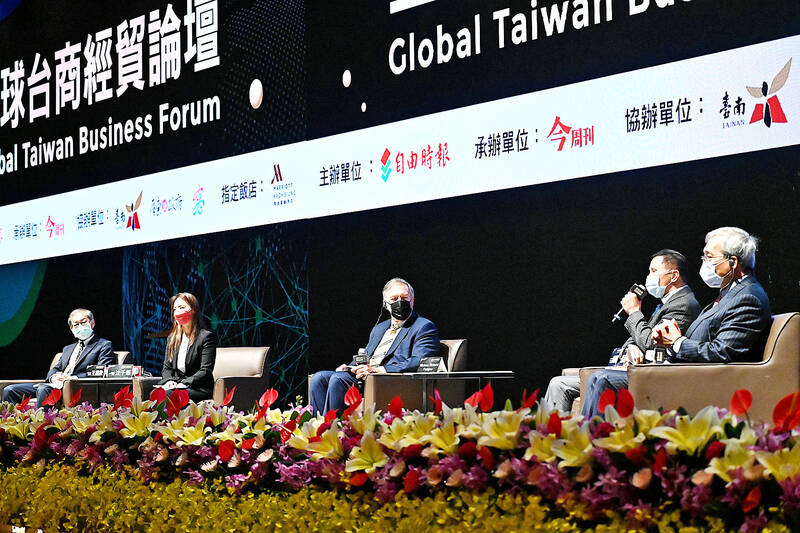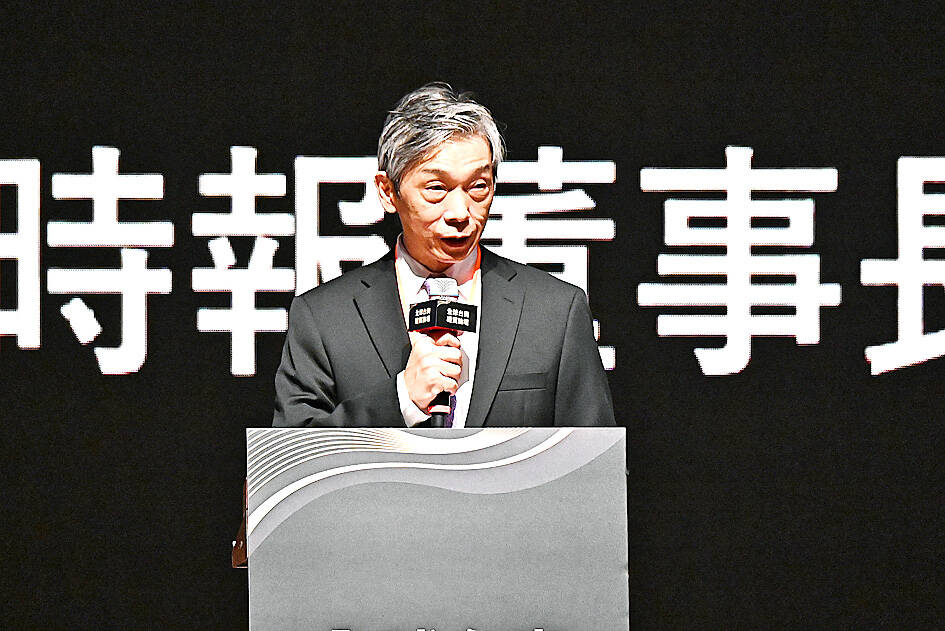Taiwan’s economy has flourished thanks to the hard work of entrepreneurs and is poised to take advantage of supply chain restructuring among other opportunities, speakers at the Global Taiwan Business Forum in Kaohsiung said yesterday.
The forum was also attended by former US secretary of state Mike Pompeo.
From the beginning, it was Taiwanese businesspeople who took the initiative to seize global opportunities, Vice President William Lai (賴清德) said in his opening address to the forum organized by the Liberty Times (sister paper of the Taipei Times).

Photo: Sam Yeh, AFP
Through their efforts, Taiwan has become the 25th-largest economy in the world and the ninth-largest trading partner of the US, with a pivotal position in global supply chains, he said.
Even amid the challenges posed by US-China trade tensions, the COVID-19 pandemic and Russia’s invasion of Ukraine, Taiwan has posted impressive results, reporting 6.57 percent GDP growth last year — an 11-year high, he said.
These challenges — as well as shifting production bases and China’s use of its economy as a political tool — have alerted democracies to the need for a more secure, reliable global supply chain, in which Taiwan must play a part, Lai said.

Photo: Lee Hui-chou, Taipei Times
Taiwanese businesses over the past 30 years have relied on cheap Chinese production, but that strategy is no longer feasible given the weaknesses inherent in China’s exports and its real-estate-reliant economic model, Lai said.
The answer is to partner with other democracies to restructure the supply chain, which many Taiwanese businesses have already started doing, he added.
“Businesspeople have always been the drivers of Taiwan’s economy,” Liberty Times Group chairman Andy Lin (林鴻邦) said in his speech.

Photo: Lee Hui-chou, Taipei Times
Taiwanese have invested all over the world, with total investment reaching almost US$400 billion since 1952, he said.
From the trying early days without export markets, to today’s worldwide presence, businesspeople have been “important representatives of Taiwan’s competitiveness,” Lin said.
Amid current challenges, through the “pioneering efforts of businesspeople — together with the diligence, technical expertise and innovative potential of the Taiwanese — we can create an economic miracle in Taiwan,” he added.
Two business leaders also talked about their views on supply chain restructuring and the move toward carbon neutrality.
As an autoparts maker, Hota Industrial Manufacturing Co is shifting its production to electric vehicles in keeping with the global trend, chief executive officer Holly Sheng (沈千慈) said.
The number of electric vehicles produced globally by 2025 is expected to be seven times as many as last year, with every other new vehicle being electric, she added.
Taiwan has a complete supply chain for electric vehicle components from batteries to the most advanced chips, as well as original design manufacturing experience, placing the nation in an advantageous position, she said.
Sheng was upbeat on global supply chain restructuring, saying that it would bring “more predictable opportunities” to Taiwan.
The issue of carbon neutrality has transformed from an environmental matter to an economic one, with the potential to reshuffle economic winners and losers, China Steel Corp president Wang Shyi-chin (王錫欽) said.
The government has instructed heavy electricity users to move toward using only renewable energy and plans to impose a carbon tax, making the move toward carbon neutrality “urgent, rapid and serious,” he said.
Additional reporting by Lin Ching-hua

‘DENIAL DEFENSE’: The US would increase its military presence with uncrewed ships, and submarines, while boosting defense in the Indo-Pacific, a Pete Hegseth memo said The US is reorienting its military strategy to focus primarily on deterring a potential Chinese invasion of Taiwan, a memo signed by US Secretary of Defense Pete Hegseth showed. The memo also called on Taiwan to increase its defense spending. The document, known as the “Interim National Defense Strategic Guidance,” was distributed this month and detailed the national defense plans of US President Donald Trump’s administration, an article in the Washington Post said on Saturday. It outlines how the US can prepare for a potential war with China and defend itself from threats in the “near abroad,” including Greenland and the Panama

A wild live dugong was found in Taiwan for the first time in 88 years, after it was accidentally caught by a fisher’s net on Tuesday in Yilan County’s Fenniaolin (粉鳥林). This is the first sighting of the species in Taiwan since 1937, having already been considered “extinct” in the country and considered as “vulnerable” by the International Union for Conservation of Nature. A fisher surnamed Chen (陳) went to Fenniaolin to collect the fish in his netting, but instead caught a 3m long, 500kg dugong. The fisher released the animal back into the wild, not realizing it was an endangered species at

The High Prosecutors’ Office yesterday withdrew an appeal against the acquittal of a former bank manager 22 years after his death, marking Taiwan’s first instance of prosecutors rendering posthumous justice to a wrongfully convicted defendant. Chu Ching-en (諸慶恩) — formerly a manager at the Taipei branch of BNP Paribas — was in 1999 accused by Weng Mao-chung (翁茂鍾), then-president of Chia Her Industrial Co, of forging a request for a fixed deposit of US$10 million by I-Hwa Industrial Co, a subsidiary of Chia Her, which was used as collateral. Chu was ruled not guilty in the first trial, but was found guilty

DEADLOCK: As the commission is unable to forum a quorum to review license renewal applications, the channel operators are not at fault and can air past their license date The National Communications Commission (NCC) yesterday said that the Public Television Service (PTS) and 36 other television and radio broadcasters could continue airing, despite the commission’s inability to meet a quorum to review their license renewal applications. The licenses of PTS and the other channels are set to expire between this month and June. The National Communications Commission Organization Act (國家通訊傳播委員會組織法) stipulates that the commission must meet the mandated quorum of four to hold a valid meeting. The seven-member commission currently has only three commissioners. “We have informed the channel operators of the progress we have made in reviewing their license renewal applications, and